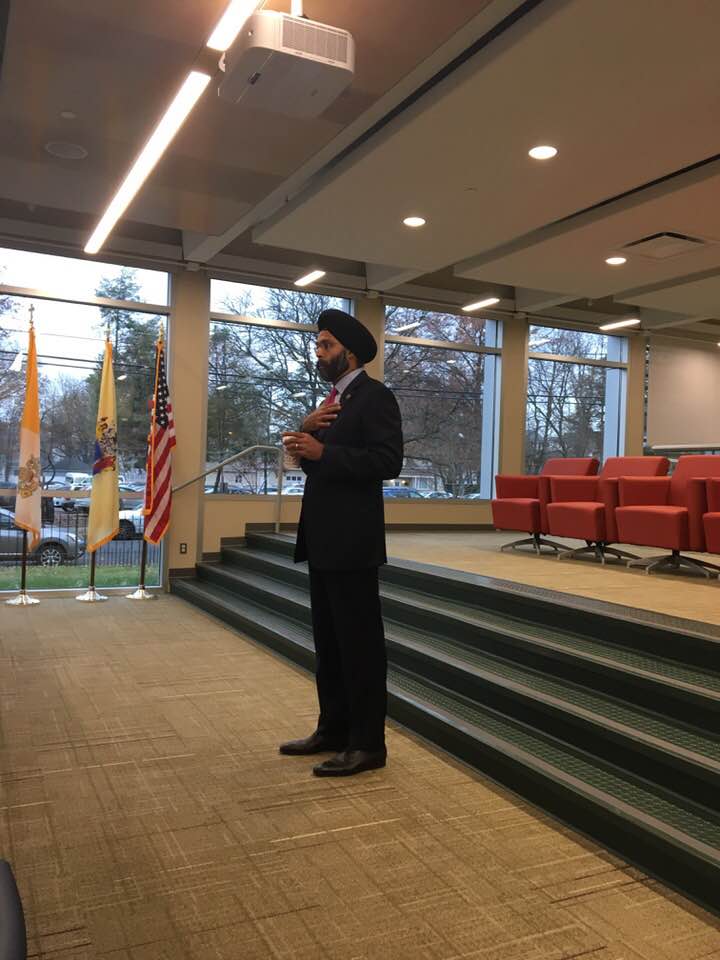Congratulations to Bergen County Prosecutor Gurbir Grewal for his nomination to the position of Attorney General of New Jersey by Governor-Elect Phil Murphy.
I got to know Gurbir last year when he spoke at the series on “Race and Criminal Justice in America” that I organized at Felician University; I was deeply impressed then, and remain impressed now, at his capacity to walk the fine line between prosecutorial toughness about enforcing the law, and moral sensitivity to considerations of justice. It’s a tough balancing act, but I sleep better at night knowing that someone knows how to pull it off. Because I certainly don’t.
The more I learned about the reform-minded work he was doing in Bergen County, the sillier it seemed to adopt the purely spectatorial perspective of an Ivory Tower critic of law enforcement–and the more urgent it seemed to learn about law enforcement by trying to participate in it. I was, frankly, blown away by the effort that his office spent on outreach, training, and education, for officers as well as non-officers: every one of them was normative food for thought for anyone interested in anything as concrete as how to conduct a crash investigation, or anything as abstract as how to reform a path-dependent legal system.
If only philosophers spent as much effort on outreach to law enforcement. The more time I’ve spent trying to immerse myself in the world of law enforcement (and in truth, I’ve spent relatively little), the clearer it’s become that immersion in the world of practice is worth a thousand philosophy seminars on “ideal theory“–not because it casts doubt or aspersions on the need for ideal theory, but because it brings that topic back down to earth.
I was also impressed at Gurbir’s capacity to balance apparently divergent skill-sets in complementary ways–the normative-theoretical, the managerial, the legal, the enforcement-oriented, and the social-scientific. The three years I spent as a department chairman managing a department of ten people made me want to kill myself; how, I thought, am I supposed to be a philosopher while focusing on such managerial idiocy as this? I still don’t know the answer, but there are people in the world who can oversee a staff of 265, supervise 72 law enforcement agencies, try and win major criminal cases, give informative lectures at nearby liberal arts colleges, and keep abreast of the latest work in criminology more or less at once. And it’s an interesting if neglected philosophical question how such people manage to do what they do–without discernibly wanting to kill themselves.
I learned a huge amount in the relatively modest time (in one sense) that Gurbir and I spent together, but am grateful for his willingness to take what was (in another sense) an enormous amount of time out of his busy schedule to bring a mere philosopher up to speed in how the world of law enforcement really works. He’s the perfect pick for the job of Attorney General; Murphy’s choosing him is a harbinger of better days for New Jersey, and with some luck, the country.

Pingback: A Postscript to the Class: Gurbir Grewal Named Attorney General | Khawaja's Phil/Crim 380 Blog
A nice follow-up in The New York Times:
Gurbir is 44; I’m 48. Both of us are of roughly the same ethnicity and grew up within miles of each other in Essex County, New Jersey. So I was (in a weird way) gratified to read this passage in the article, if only to confirm my own experiences growing up:
I know the feeling. It sickens me to hear the normalization of the word today, especially among my students, African-American and otherwise, who use it so casually that you’d have trouble believing it was (is!) a slur. The most shocking recent instance was a student who used the word “nigger” as an example of a moral non-issue (of a “trumped-up” issue in the sense used by Tosi and Warmke): he used the word all the time, he said, and couldn’t see the “moral” problem in doing so. As I write that, a phrase of Hemingway’s comes instantly to mind: “lost generation.” Or, more optimistically: “lost generation”?
LikeLike
Pingback: Nervous Shakedown: Scenes from a Police Detention | Policy of Truth
Pingback: She Fights the Law and She Wins | Policy of Truth